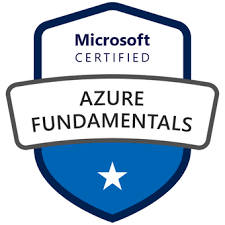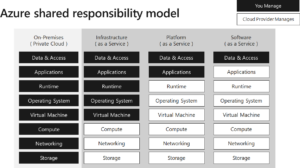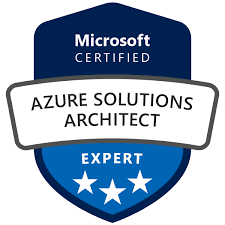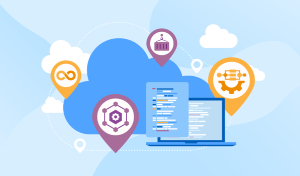Audience
This course is suitable for program managers and technical sales, with a general IT background. These students want to learn about our offerings, see how components are implemented, and ask questions about products and features. This course does not provide an Azure pass or time in the classroom for students to do any hands-on activities. Students can get a free trial and do the walkthroughs outside of class. This course is primarily lectures and demonstrations. This course will help prepare someone for the AZ-900 exam.
Prerequisites
There are no prerequisites for taking this course. However, the more technical knowledge a student has, the more they will understand about the cloud.
Skills Gained
After completing this course, students will be able to:
• Describe cloud concepts
• Describe core Azure services
• Describe core solutions and management tools on Azure
• Describe general security and network security features
• Describe identity, governance, privacy, and compliance features
• Describe Azure cost management and Service Level Agreements
Course outline
Module 1: Describe core Azure concepts
In this module, you’ll take an entry level end-to-end look at Azure and its capabilities, which will provide you with a solid foundation for completing the available modules for Azure Fundamentals.
Lessons
• Introduction to Azure fundamentals
• Discuss Azure fundamental concepts
• Describe core Azure architectural components
After completing this module, students will be able:
• Understand the benefits of cloud computing in Azure and how it can save you time and money.
• Explain concepts such as high availability, scalability, elasticity, agility, and disaster recovery.
• Describe core Azure architecture components such as subscriptions, management groups, and resources.
• Summarize geographic distribution concepts such as Azure regions, region pairs, and availability zones.
Module 2: Describe core Azure services
In this module, you learn about core Azure services like Azure database, Azure compute, Azure storage, and Azure Networking.
Lessons
• Explore Azure database and analytics services
• Explore Azure compute services
• Explore Azure Storage services
• Explore Azure networking services
After completing this module, students will be able:
• Understand the services available in Azure including compute, network, storage, and databases.
• Identify virtualization services such as Azure VMs, Azure Container Instances, and Azure Kubernetes.
• Compare Azure’s database services such as Azure Cosmos DB, Azure SQL, and Azure Database for MySQL.
• Examine Azure networking resources such as Virtual Networks, VPN Gateways, and Azure ExpressRoute.
• Summarize Azure storage services such Azure Blob Storage, Azure Disk Storage, and Azure File Storage.
Module 3: Describe core solutions and management tools on Azure
In this module, you’ll learn about AI machine learning, Azure DevOps, monitoring fundamentals, management fundamentals, serverless computing fundamentals. and IoT fundamentals.
Lessons
• Choose the best AI service for your needs
• Choose the best tools to help organizations build better solutions
• Choose the best monitoring service for visibility, insight, and outage mitigation
• Choose the best tools for managing and configuring your Azure environment
• Choose the best Azure serverless technology for your business scenario
• Choose the best Azure IoT service for your application
After completing this module, students will be able:
• Choose the correct Azure AI service to address different kinds of business challenges.
• Choose the best software development process tools and services for a given business scenario.
• Choose the correct cloud monitoring service to address different kinds of business challenges.
• Choose the correct Azure management tool to address different kinds of technical needs.
• Choose the right serverless computing technology for your business scenario.
• Choose the best Azure IoT service for a given business scenario.
Module 4: Describe general security and network security features
In this module, you will learn how to protect yourself against security threats, and secure your networks with Azure.
Lessons
• Protect against security threats on Azure
• Secure network connectivity on Azure
After completing this module, students will be able:
• Strengthen your security posture and protect against threats by using Azure Security Center.
• Collect and act on security data from many different sources by using Azure Sentinel.
• Manage dedicated physical servers to host your Azure VMs for Windows and Linux.
• Identify the layers that make up a defense in depth strategy.
• Explain how Azure Firewall enables you to control what traffic is allowed on the network.
• Configure network security groups to filter network traffic to and from Azure resources.
• Explain how Azure DDoS Protection helps protect your Azure resources from DDoS attacks.
Module 5: Describe identity, governance, privacy, and compliance features
In this module, you will learn about Azure identity services, how to build a cloud governance strategy, and privacy, compliance and data protection standards on Azure.
Lessons
• Secure access to your applications by using Azure identity services
• Build a cloud governance strategy on Azure
• Examine privacy, compliance, and data protection standards on Azure
After completing this module, students will be able to:
• Explain the difference between authentication and authorization.
• Describe how Azure Active Directory provides identity and access management.
• Explain the role single sign-on (SSO), multifactor authentication, and Conditional Access play.
• Make organizational decisions about your cloud environment by using the CAF for Azure.
• Define who can access cloud resources by using Azure role-based access control.
• Apply a resource lock to prevent accidental deletion of your Azure resources.
• Apply tags to your Azure resources to help describe their purpose.
• Control and audit how your resources are created by using Azure Policy.
• Enable governance at scale across multiple Azure subscriptions by using Azure Blueprints.
• Explain the types of compliance offerings that are available on Azure.
• Gain insight into regulatory standards and compliance on Azure.
• Explain Azure capabilities that are specific to government agencies.
Module 6: Describe Azure cost management and service level agreements
In this module, you will learn how to plan and manage Azure costs, and how to choose the right Azure services though SLAs and service lifecycle.
Lessons
• Plan and manage your Azure costs
• Choose the right Azure services by examining SLAs and service lifecycle
After completing this module, students will be able to:
• Use the Total Cost of Ownership Calculator.
• Describe the different ways you can purchase Azure products and services.
• Use the Pricing calculator to estimate the monthly cost of running your cloud workloads.
• Define the major factors that affect total cost and apply recommended practices to minimize cost.
• Describe what a service-level agreement (SLA) is and why SLAs are important.
• Identify factors, such as the service tier you choose, that can affect an SLA.
• Combine SLAs to compute a composite SLA.
• Describe the service lifecycle in Azure.
Schedule
Click on the following link to see the current Course Schedule
Our minimum class-size is 3 for this course.
If there are no scheduled dates for this course, it can be customized to suit the time and skill needs of clients and it can be held online, at a rented location or at your premises.
Click on the following link below to arrange for a custom course: Enquire about a course date







Reviews
There are no reviews yet.